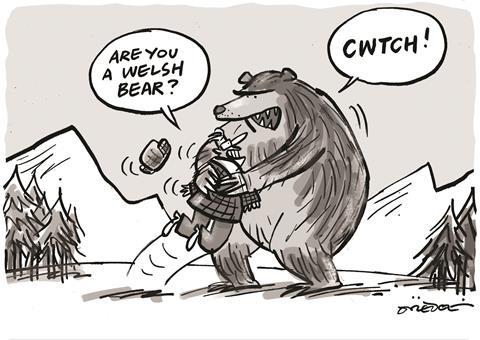
It is one of my earliest childhood memories. I am probably not more than two or three and there is music playing on the radio. Suddenly my dad picks me up, gently wraps his arms around me, and begins to slowly dance with me. I can still feel the warmth of his hand on the back of my head as he snuggles me close, his voice humming softly to the music.
Another precious memory was made just a few days ago at the end of a group trip to the Holy Land. We’d spent nine beautiful days together, marvelling at the biblical sites, pondering the complexity and pain of the political situation, sharing deeply personal stories that invoked laughter and tears. Relative strangers had bonded together as a travelling community. Then came time for the group to say farewell. There were hugs aplenty.
But one embrace was very special. A Welsh gentleman approached me, a warm smile lighting up his face. “I’d like to give you more than a hug, Jeff. In Wales we like to offer a cwtch.” He explained the word is pronounced kutch (to rhyme with ‘butch’), adding: “A cwtch is more than a hug, and it’s not given lightly.
The word means ‘a place of safety’; we offer it as comfort, as a refuge when life brings trouble.” I learned that the cwtch has the magical quality of transporting someone back to the safety of their childhood.
In a healthy family, a child has no cares about the cost of the mortgage, the occupant of 10 Downing Street or the sabre-rattling of despots and dictators. In the warmth of that hug, all is well. As he left moments later, I wiped away a grateful tear and recalled the wonder of that childhood waltz.

For most of us, there has never been a moment in history when we needed to share the comfort of a cwtch more. Most of us have never known the unfathomed depths of wartime heartache; the uncertainty, the rationing, the partings. And so the triple knockout punches of the cursed Covid, the distant but very real agony of Ukraine and the apocalyptic economic realities have sent us reeling.
In all of this, we walk with Jesus, who portrayed his own work as being like a father awaiting the return of a wayward son who had sinned prodigiously. Mired from the muck of the pigpen (an especially shocking image for his Jewish listeners), the lad at last staggers home.
He is a mixture, this prodigal son. His repentance is, at best, flawed; genuine sorrow mingled with desperation for a healthy meal and the safety of home. But to his amazement, he sees his father charging towards him – a shock in a culture in which men never ran (it was considered undignified). Before he has a chance to utter a word of contrition, he is wrapped in a cwtch.
Ponder him there, blurting out that he is unworthy, begging only for a job as a servant. He is us, wriggling with discomfort when, shamed by our sins, we hear of the love divine that truly is all loves excelling. Held there, at last it dawns: he is safe, received, welcomed, utterly loved. This is more than a sentimental portrait, but an absolutely dependable picture of our wonderful God.
So let’s not wrestle with his love. As fellow travellers together, let’s determine to look beyond the horizons of our own needs and concerns and, with a word of kindness, a surprise gift or a warm hug, let’s pass that love around. Because this much is certain: in our world, today, someone needs a cwtch.





































No comments yet